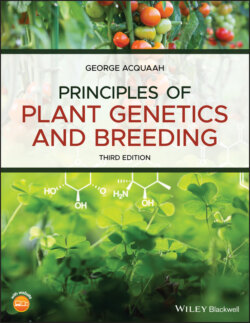Читать книгу Principles of Plant Genetics and Breeding - George Acquaah - Страница 169
Definition
ОглавлениеThe concept of the reliability of the phenotypic value of a plant as a guide to the breeding value (additive genotype) is called the heritability of the metrical trait. As previously indicated, plant breeders are able to measure phenotypic values directly, but it is the breeding value of individuals that determines their influence on the progeny. Heritability is the proportion of the observed variation in a progeny that is inherited. The bottom line is that if a plant breeder selects plants on the basis of phenotypic values to be used as parents in a cross, the success of such an action in changing the characteristics in a desired direction is predictable only by knowing the degree of correspondence (genetic determination) between phenotypic values and breeding values. Heritability measures this degree of correspondence. It does not measure genetic control, but rather how this control can vary.
Genetic determination is a matter of what causes a characteristic or trait; heritability, by contrast, is a scientific concept of what causes differences in a characteristic or trait. Heritability is, therefore, defined as a fraction: it is the ratio of genetically caused variation to total variation (including both environmental and genetic variation). Genetic determination, by contrast, is an informal and intuitive notion. It lacks quantitative definition and depends on the idea of a normal environment. A trait may be described as genetically determined if it is coded in and caused by the genes, and bound to develop in a normal environment. It makes sense to talk about genetic determination in a single individual, but heritability makes sense only relative to a population in which individuals differ from one another.
